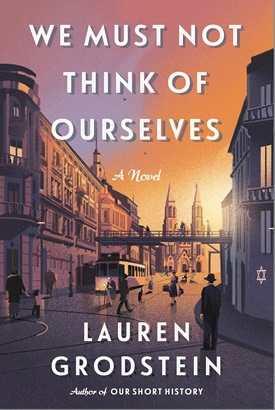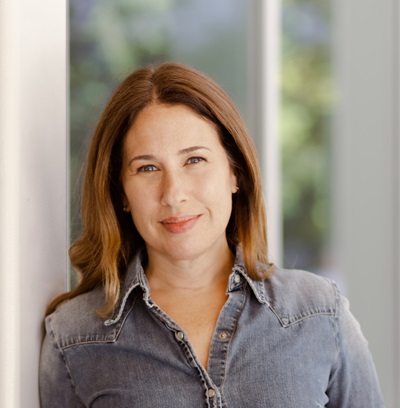 Synopsis:
Synopsis:
Adam Paskow is a teacher forced to share a cramped one-bedroom apartment with two other families after their Jewish community is herded into the Ghetto and cut off from the rest of Warsaw in 1940.
Adam uses literature to help his students endure their unbearable situation and come to terms with what is happening around them, but it’s nearly impossible to focus on poetry when they are bartering daily for food and just beyond the Ghetto’s walls the war is intensifying.
Recruited to participate in the Oneg Shabbat Archive – a secret project devised to preserve the stories of the Ghetto’s residents — Adam begins to take testimonies from his students, friends, and neighbors, documenting their histories.
Their testimonies teach him how to survive — even how to find joy — in a place where young boys set up their own black markets, young girls try to pass as Aryan, and, in a desperate, upside-down world, no choices are good ones.
We Must Not Think of Ourselves was inspired by the actual archives through which Jewish Warsaw’s stories managed to survive World War II. It is a compelling novel of defiance and resilience.
Review:

Lauren Grodstein teaches in the MFA Program at Rutgers University-Camden and is the author of four previous novels, including The Explanation for Everything and Our Short Story. Had her great-grandparents not left Warsaw twenty years before World War II, she says she likely would not have been born. She first learned about the Oneg Shabbat Archive in 2019 when she traveled to Poland with her family and they “stumbled into” the Archive, one wall of which bears the words “What we’ve unable to shout out to the world.” Displayed there are notebooks, paintings and drawings, and one of the large milk cans in which those documents were buried so that they, fortunately, withstood the destruction of the Warsaw Ghetto in 1943. Grodstein recalls that as they were leaving, she observed, “There are a thousand novels in that room,” to which her sister replied, “Maybe you should write one.” She then spent a full year researching and pondering the story because she wanted to be sure she could “do justice to those people and their stories, and honor them.”
“It is up to us to write our own history. Deny the Germans the last word.” We Must Not Think of Ourselves opens with that December 1940 entreaty to fictional Adam Paskow. He is enlisted to record “all the details, even if they seem insignificant,” as part of an archival project so that after World War II, the world will know “the truth about what happened.” Adam agrees, accepting the risk that if his activities are discovered, he will likely be executed. The archive group is called Oneg Shabbat, meaning “the joy of the Sabbath.”
Adam begins with his own history. In a first-person narrative, he explains that he is a Jewish English teacher living in a cramped apartment with two other families, teaching about four to six students in the basement of a bombed-out movie theater. He met his wife, Kasia, when they were both studying English literature in college. She was the Catholic daughter of a wealthy and influential official with the Polish government. They married in 1930 and were happy, even though they were never able to have children, until she died tragically. Even after her death, her father, Henryk, who at least ostensibly accepted his daughter’s marriage to a Jewish man, continued serving as Adam’s benefactor, enabling him to continue residing in their stylish apartment on his public teacher’s salary. After being forced to relocate to the Ghetto, Adam resolved to continue teaching, despite having no novels, short stories, or textbooks, and committed to assigning to his pupils only uplifting and joyous poems that he memorized over the years. His students attend class sporadically, largely because they are often engaging in forbidden bartering or stealing in an effort to gather enough food for their families to survive.
We Must not be comfortable. We must not think of ourselves.
A year after Germany invaded Poland, Adam still struggles to understand world events and the purported logic behind them. He remains understandably baffled by the bombardment and decimation of his homeland, and the unbridled atrocities he has already witnessed. He cannot fathom what the Polish people may have done to provoke the “terrorizing of children, the stabbing of old men on the streets, the rape of our young women, and the public hanging of our soldiers.” He could have fled to Palestine to reside with his brother and mother, but like so many others, he stayed. “We had our lives and our livelihoods, and couldn’t envision starting over somewhere” else. “I’ll wait for the Allies, I suppose,” Adam told his father-in-law, when Henryk offered to secure a Polish kennkarte (passport) for him. (Henryk suspiciously sought to retrieve jewelry he gifted Kasia — items Adam viewed as a potential safety net) Adam could not foresee, of course, that the Germans would rob him and his fellow Jews of much more than their money, prohibiting them from practicing their professions, forcing them out of their homes and synagogues, denying them basic civil rights, and, finally, taking their freedom, insisting they had to be relocated because they “carried disease.” Only when Adam arrives at his new apartment does he realize that he has been double-crossed by Henryk and the apartment he believed he would solely occupy will, in fact, also be home to the Lescovec and Wiskoff families and their total of five rambunctious sons. With no options, they all agree “to try to live our lives peaceably . . . until a better situation presents itself.” The gates to the new district in which they are forced to reside were locked on November 16, 1940.
To relate the stories of those he interviews for the project, Grodstein includes Adam’s notes. Their histories are fascinating, absorbing, and largely heartbreaking. As the days pass, their living conditions worsen and they do not have enough food. But there is a black market and Adam saved some valuable items to trade, a dangerous endeavor, in order to help feed the children who are part of his household. Adam’s narrative is straightforward and candid, his descriptions of the horrors of life in the Ghetto and the brutalities he witnesses unsparing, but essential to an understanding of his experiences and emotions.
Adam is principled, dedicated to his students, and likable. His story is completely gripping and sympathetic. His naivete is evident, as Grodstein illustrates, in part, through his interactions with other characters. He grows close to his housemates, especially Sala Wiskoff, who is focused on keeping her two sons alive. They are actively smuggling food, while her husband, Emil, has been leveled by grief over the death of his mother. Sala ponders whether they are “really are just waiting here to die.” Adam rationalizes that “they can’t kill all of us. What would be the gain in that? It’s illogical. And the Nazis pride themselves on being logical.” Isolated and cut off from the rest of the world, Adam and his fellow prisoners in the Ghetto have no idea what is actually taking place beyond the locked gates. But their musings and struggle to find reason in a world gone mad is fascinating, thought-provoking, and enlightening, especially when considered through the lens of history.
Grodstein has deftly created a cast of vibrant characters whose stories are mesmerizing. Szifra Joseph, a beautiful and intelligent fifteen-year-old who was Adam’s student before the war, is one of the most memorable. Her family was wealthy – her father owned a clothing factory which was commandeered by the Germans – but now her mother, on the verge of complete mental collapse, toils in a brush factory and her younger brothers risk their lives foraging for food. Her family has connections to the Warner Brothers in Hollywood, and she plans to use those connections to make her way to California once the Ghetto is liberated. Because of all she has been through, she is angry, outspoken, cynical, and jaded. She believes she can secure her family’s safety through manipulation and persuasion, relying on her charms to gain favor with their captors. She is certain she can obtain kennkartes that will enable them to escape. “It is my choice to take charge of my life and my goals and protect my family and rely on the good graces of whomever can help me,” she tells Afam.
We Must Not Think of Ourselves is moving and emotionally impactful because, remarkably, Grodstein manages, seemingly effortlessly, to craft an engrossing story that is both uplifting and life-affirming. Despite everything he must ensure, Adam finds love and it helps sustain him as, with each passing day, matters grow more dire. The relationship is undeniably born from the circumstances in which Adam and the woman find themselves, but the ways in which they cling to and comfort each other are believable, understandable, and deeply affecting. Grodstein says it was “very important to me to shine a light in the darkness. Even with material as serious as this, to provide some sense that life could get better at the end.” Indeed, as the late Harvey Milk wisely observed, “You cannot live on hope alone, but without it, life is not worth living.” Despite his experiences, Adam – in part because he is too naïve and inherently decent to imagine the extent and types of evil the Nazis will eventually unleash – is able to maintain hope that the Allies will in fact rescue him and the others. His commitment to the archive is evidence of his optimism and belief that the world will someday know the truth about exactly what transpired in the Ghetto. Which is not to say that his confidence is unfailing. He fights not to fall into permanent dispair, at one point convinced that “we are creating a portrait of Polish Jews at the end of our history.” However, Grodstein credibly shows that holding on to optimism and hope leads to triumph, even if not without sacrifice.
We Must Not Think of Ourselves is one of the best books of 2023, a stand-out tale on bookshelves crowded with volumes of World War II historical fiction. Grodstein elevates the genre because of the compassionate, measured, and seamless way she relates the various ways in which Adam and the other characters refuse to give up, give in, or relinquish their identities and histories . . . or abandon their commitment to the truth. In addition to being an absorbing and deeply moving exploration of events that occurred in a particular time and place to a specific group of people, it is also both contemporary and timely, a warning against complacency and a conviction that history is incapable of repeating itself. She says her motivation for penning the book was a “desire to honor those who remained, who died, and who left us their words. . . . I did my best to hear, and to share, what they could not shout out to the world.” We Must Not Think of Ourselves is inarguably the loving and riveting homage she envisioned.
Excerpt from We Must Not Think of Ourselves
Seventeen
The next evening, Filip strutted into the apartment with two large bags of chicken feet that he had traded for somewhere on the outside. He had recently turned twelve and was starting to grow; perhaps his prosperity as a trader had provided him with the requisite calories for a proper growth spurt, or perhaps the human body would do what it was designed to do even in the most absurd of circumstances. Either way, he was a good ten centimeters taller than he’d been when we’d met, and his shoulders had started to broaden. His voice was changing too, becoming deeper. I noticed it especially when he practiced his English with me. In English, he sounded almost like a man.
“I’ll trade you four feet for next week’s lesson,” I said. (The going price for English lessons was three zloty or, lately, whatever the children’s families could spare; I had no idea what the going rate was for chicken feet, since chicken was not legal for purchase in the ghetto.)
“I risked my life for these,” he said; he said it casually. “But I’ll give you a discount. Four for five zloty.”
“That’s highway robbery,” I said. “Those are just feet!”
Filip shrugged. “You hungry?” He’d grown nervy.
I sighed. My satchel was on the counter; I reached in and handed him his zloty. He plucked four feet out of one of his bags and handed me the skinny, clawlike things. They were fresh, with feathers on their anklebones and needlelike nails on the ends of the toes. They looked, frankly, disgusting. But you could boil them for a while and then fry them, and they would make an edible snack. When I was a child, we ate them frequently when my father was deployed and his government subsidy disappeared in the mail.
“So what’s it like right now on the outside, anyway?” I said, using an old kitchen knife to pare the claws off the feet.
“Better than here,” he said, watching me work with an expression of mild amusement. “But still not great.” His hair was growing in thicker than it had been before he’d shaved it for typhus, and darker too. This had happened to my own hair when I was his age; fine blondish wisps had become the coarse brownish-blondish curls that Kasia used to trim by the sink.
“How so?”
“People seem hungrier,” he said, “and there’s less in the shops. There are more beggars in the streets, and the Germans beat them up or take them away in police vans. There are still rich people, though. You can see it in the way they dress. They still have cars, jewelry. They’re still shopping.”
“Any news of the war?” Filip shrugged. It was one of the luckiest aspects of youth, this ability to be nonchalant. “I don’t know, really. I saw some headlines in the newsstand that the Germans are proceeding to Moscow, but it might be propaganda. They have a lot of the same news outside that they do in here.”
I sighed and scraped at my chicken. Our contraband transistor had updated us with the same news, German troops mowing down Russians like they were so many toy soldiers, but it was hard to know if this was the truth. Occasionally, we would get a blessed crackle of British news, but this, too, felt like propaganda: The Germans were on the retreat; they had underestimated the number and relentlessness of the Russians. And now that Stalin was awakened to the danger of Hitler, the Russian bear would roar. But how could all this be true at the same time, that the Russians were winning and losing, that the Germans were decimating the Soviets and losing three hundred Panzer tanks a day? It was all paradox, nonsense. And so we waited in our hot and crowded apartment, stinking, sweating, hungry, waiting for deliverance and unable to know the direction from which it was coming.
“I did hear that the Germans captured Minsk,” Filip said, after a minute.
“Yes,” I said. “I heard that too.”
Filip removed his whittling knife from his shirt pocket and a stick from his bag and began whittling, idly, his motions matching mine. We worked with our knives in several minutes’ silence.
“You still carve dinosaurs?” I asked.
He shrugged. “They weren’t dinosaurs.” He peeled the bark off the stick with long strokes; the bark curled in light-brown rings on the table. I finished up with my chicken feet and put them in a pot, turned on the tap: mercifully, water.
“How did you get this stuff, anyway?”
“I traded for them. A pair of candlesticks. I think they were bronze. Or gold. A golden color, anyway.”
“Where did you find bronze candlesticks?”
“People die here all the time,” he said. “They leave a lot of stuff behind.”
“And you just take it?”
“I don’t just take it,” he said. “I turn it into food.”
The water filled the pot—drip, drip, drip — and I wondered if I had scaled the feet correctly, and if I would be able to find the oil to fry them later, or if I would just eat them as they were, pale and bony. I had eaten all sorts of sludge these past months, grateful for every bite: potato-peel soup, beet-top soup, jarred, salted cabbage. And then, occasionally, I celebrated — with illegal chicken or eggs from the proceeds of a pair of Kasia’s shoes, illegal white flour from the sale of our old vinyl records.
“You scavenge,” I said.
“I guess that’s the word.”
“Yes,” I said. And then, for some reason, I repeated it in English: “Scavenge. You are a scavenger.”
“Scavenger,” Filip repeated in English, his voice resonant and deep. “It’s a nice-sounding word.”
We were quiet again. I watched Filip whittle his stick into something fine and sharp-looking.
“What’s happening in here?” Pani Lescovec, Filip’s mother, bustling in in her housecoat. “Filip, you found chicken? How on earth?” She was damp from sweat, had been cleaning the hallway we shared with three other apartments, where the children played and sometimes slept. Her graying hair stood up in loose curls around her broad face.
“Just chicken feet, Eema.”
“Chicken feet — that’s not nothing. Where did you get them? How did you get outside?”
“I was careful.”
“Were you?”
“I always am.”
“Oh, how I worry about you,” she said, hugging him close. Pressed against his mother’s side, Filip looked like a young child again. “My smart boy.”
“I just sold four feet to Pan Paskow. Five zloty,” he said, proud of his dealmaking.
“And what are you doing with them, Pan Paskow? Boiling?” She peered into my pot. “They’re not properly peeled.”
“I was going to fry them next,” I said apologetically; in our household, it was known that Pani Lescovec was the most assiduous and talented cook.
“My son risked his life for these!” she said from her position at the stove. “You should treat them with respect.”
“Eema, come on. I didn’t risk my life.”
“You did!”
“I’m sorry, Pani Lescovec,” I said, with as much deference as I could muster. “You know I’m not much of a cook.”
Assuaged, she used a slotted spoon to pull the feet out of the water and onto a plate. She blew on them to cool them, and then started pulling off the skin and reserving it on a towel (How long would it be until we had to start selling our kitchen supplies? How long until we no longer had towels, plates, slotted spoons, chicken feet?)
“I’ll fry this skin for you,” she said. “It will taste something like gribenes. Do you know gribenes? I need an onion. Is it possible we have an onion?”
“I’ll go find you one, Eema,” said Filip.
“No, it’s not worth it. I don’t want you to go outside.”
“It’ll take five minutes.”
“Make it three minutes. It’s getting dark,” she said as Filip hurried out of the kitchen. “I have enough stress as it is.”
But she was smiling. The thought of an onion, fried chicken skin, a somewhat proper meal.
She returned the chicken feet to the pot and set it back to boil on the rickety stove. Watching her put me in mind of my own mother a million years before: the ease at the stove, the ritual, unthinking nature of her movements. “You know what would really be wonderful? A carrot,” she said dreamily. “Two carrots. And maybe some celery. And some noodles. And, of course, a real chicken.”
“How did you learn to cook, Pani Lescovec?” It was a question I liked to ask the women — it got them talking.
“What do you mean?”
“I mean, how did you learn to cook?”
She turned, gave me a look like I was crazy. She had a worn, bleachedout face—thin eyebrows, soft, splotchy cheeks. Pale-green eyes, like cloudy water. “I didn’t learn to cook. I just started cooking.”
“How old were you?”
“Old enough to reach the stove.”
“Which means?”
She sighed heavily. “I don’t know, maybe five? Six? I made challah. I made soup. What everyone did.”
“Would you mind telling me more?” I asked. “While the feet boil?”
“I’m going to fry gribenes out of these,” she said. “And make chicken soup from the bones. As soon as my boy comes back with the onion.”
“That’s okay,” I said. “We can talk while you cook.”
She turned and looked at me curiously with her pale, worn-out face. “I don’t know why you’d want to talk to me,” she said. “I don’t have much to say that’s worth talking about. I’m not educated like you.”
“You don’t have to be educated to talk to me,” I said. “You just have to talk.”
“About what?” she said.
“Just . . . anything. Your life before this. Your life here.”
Pani Lescovec blushed, her splotchy cheeks growing rosy. “Nobody ever asks me about my life,” she said.
I took out my white notebook. “Let me be the first.”



Comments are closed.